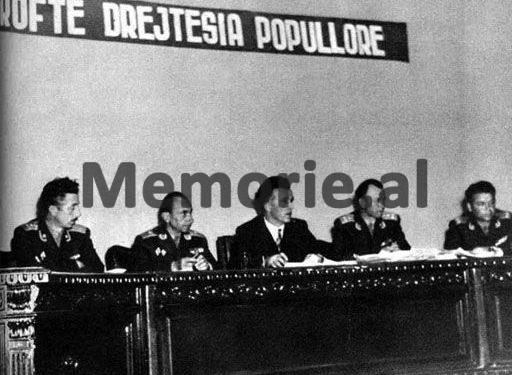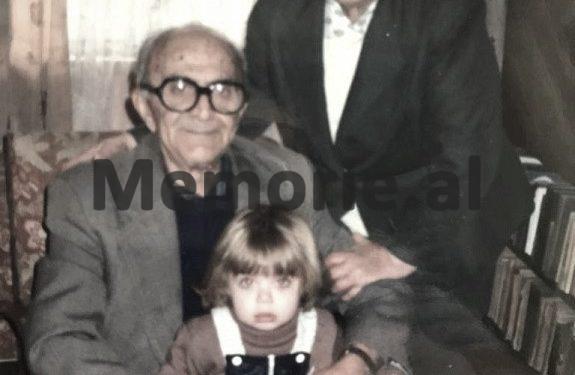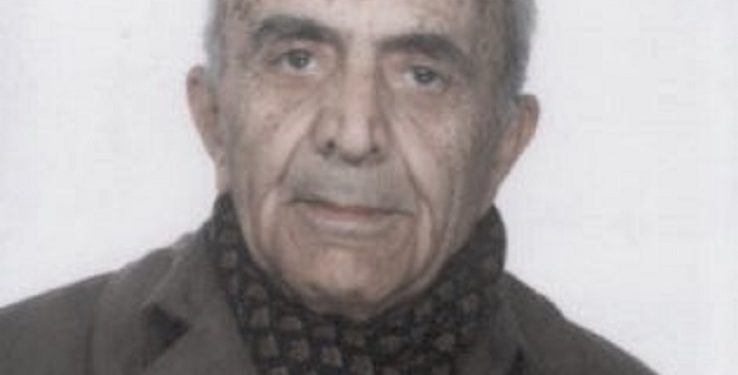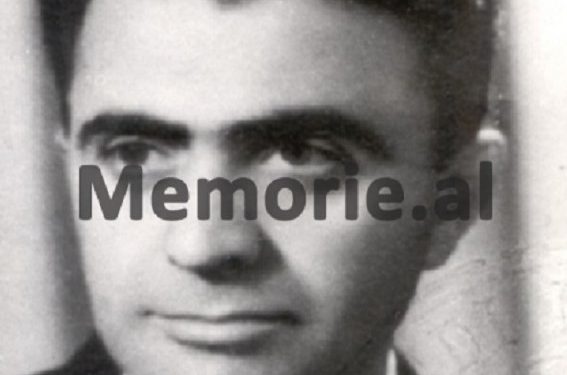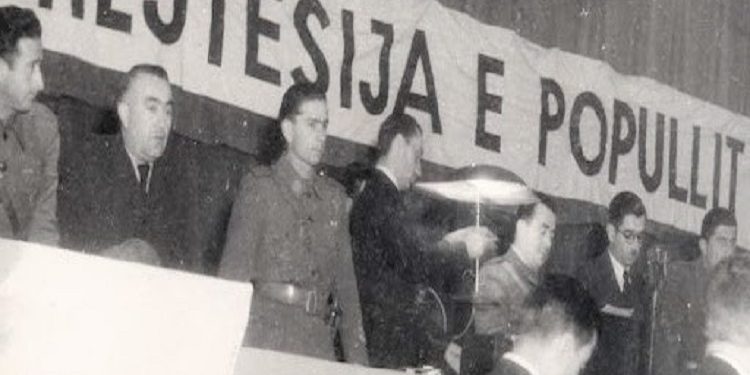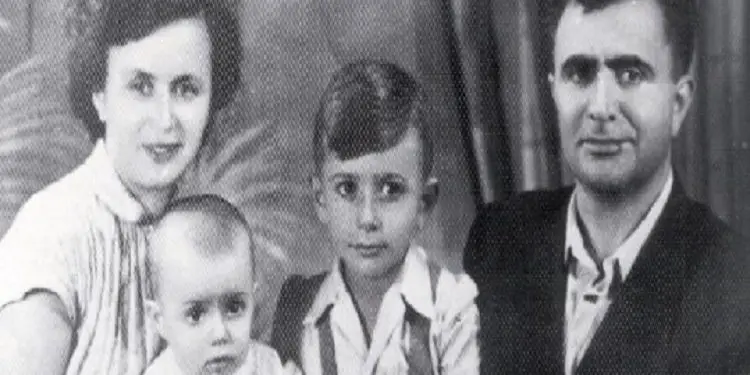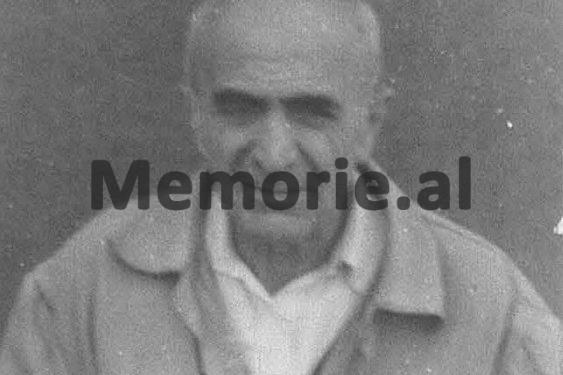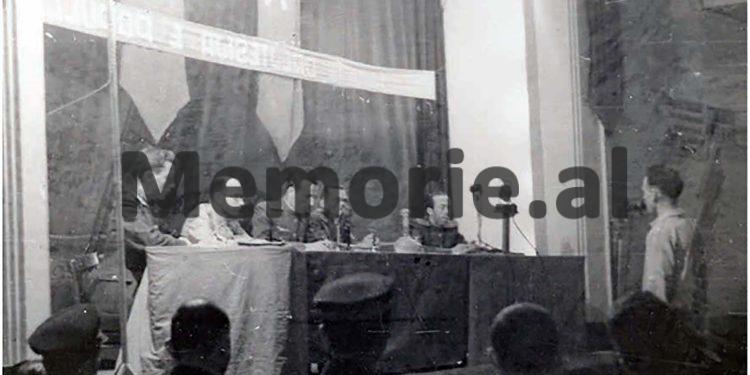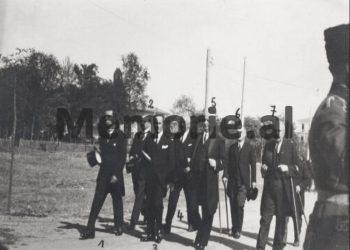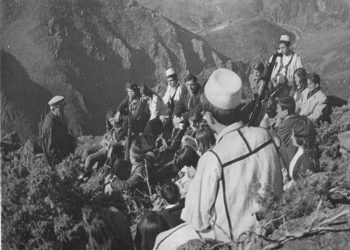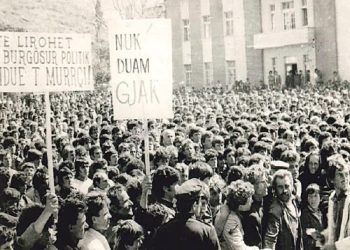Dashnor Kaloçi
Part forty-one
Memorie.al publishes a voluminous archival file issued by the institution of the Authority for Information of Former State Security Files, where there are hundreds of documents with the logo “Top secret” belonging to the former political prisoner, Xhavit Qesja, originally from the city of Kruja, whose family during the period of occupation of the country, 1939-1944, was closely associated with the Anti-Fascist Movement, being one of its main bases and made available all the wealth it had, as Xhavit was one of the first members of the Albanian Communist Party for the Kruja district, leading the Kruja-Ishëm partisan battalion and the 22nd Assault Brigade. Xhavit Qese’s political career after the end of the War, where he was appointed and served in senior positions in the Albanian Army, the apparatus of the Central Committee of the ALP, and several districts of the country, from where he was sent to study in the Soviet Union, where stayed until 1957, when he was announced to return to Albania urgently, after openly expressing his views in favor of the political line being pursued by the main Kremlin leader, Nikita Khrushchev, condemning the Stalin cult. Enver Hoxha’s conversation with Xhavit Qesen in his office in the Central Committee, where he sharply criticized him for the wrong views he had expressed during his studies in Moscow, urging him to reflect and make self-criticism, but Xhavit rejected the suggestion of the first secretary of the Albanian Labor Party, which caused him to no longer be allowed to go to the Soviet Union to complete his studies, but to be sent to work as deputy chairman of the Elbasan Executive Committee, from where a year later, he was expelled from the Party and exiled to Zvërnec Island, where the communist regime kept isolated some of the former senior party and state cadres whom he had condemned for their anti-party views. Xhavit Qesva’s long ordeal and persecution from 1957 to 1990, where he spent a full 32 years in prison and internment, being one of the few convicts in Burrell Prison who went on long hunger strikes in protest of the treatment and savage attitude that the communist regime of Enver Hoxha was holding towards him. The complete form, investigative and judicial file in charge of Xhavit Qeses, which is published for the first time by Memorie.al, which contains the documents of the former State Security that reflect the prosecution and wiretapping against him, the reports of Security collaborators with pseudonyms their correspondence with the letters he sent to the highest party and state instances, as well as the highest leaders of the ALP, until 1991 when he was released from prison!
Continued from the previous issue
Indictment against the defendant Xhavit Qesja formulated by the General Prosecutor, Shuaip Panariti, sent for trial to the Supreme Court of the People’s Republic of Albania on October 23, 1967
POPULAR REPUBLIC OF ALBANIA Tirana, on 23 .X.1967
SUPREME COURT
Minutes
The Judicial Council of the Criminal College of the High Court, formed under the chairmanship of Hilmi Telegrafi, Member of the High Court, with the assistance of Judges:
Tasi Mitrushi – Assistant Judge of the High Court
Mit’hat Ostrova – Assistant Judge of the Supreme Court
Assisted by the Deputy Secretary, Ramiz Çitozi, with the participation of the prosecutor Enver Hicka, today on 23 / X / 1967, in a closed court session, examined the criminal case No. 194, which belongs to the defendant:
Xhevit Qesja, son of Hajdari and Sabrije, born in 1922, born in the city of Kruja and resident in Zvërnec, Vlora district, with rich social status, with social status, clerk, with unfinished higher education, divorced with 2 child not previously convicted expelled from the party, arrested on 12/9/1967.
Accused of:
He committed the crime of agitation and propaganda, provided by article 72 / I of K.P.
The President of the Judicial Council, after declaring the court session open and after indicating the composition of the trial panel, where the defendant agreed with the composition of the trial panel.
The presiding judge reads the indictment and after questioning the defendant about the indictment, he rejects the indictment, saying he does not feel guilty.
The prosecutor said that it is written by the defendant, they are with hostile content towards the party of our popular power.
The chairman shows the defendant the letters written by him which are in the file and which are addressed to the Politburo of the Central Committee, asking the defendant to answer if the letters are his?
Defendant responds by saying that I sent the letters to the P.P. Central Committee. Albania and that I work with the Central Committee because I am a communist.
The chairman told the defendant that you had been brought here to be tried as an enemy, for your hostile activity as expressed above, written by you and addressed to the central body of the party, therefore responding to these letters.
The prosecutor said: the defendant is a revisionist and must answer. The presiding judge reads to the defendant one of the letters to the political office in 1966, the defendant does not respond.
The President reads to the defendants: he presents the Stalin period as a period when the force ruled, his terror, relying on the revisionists. Stalin, continuing the Prosecutor, said that he was harsh towards the enemies and therefore they could not darken Stalin’s time.
The chairman asks the defendant to respond to the decisions of the V Party Congress and where he disagrees.
The defendant does not answer the question of the President, but the defendant added, because I said so. The prosecutor said: The decisions of the 5th Congress of the Party are the basis of the empowerment of our country, are the basis of the work of our heroic Party and are the basis of Marxism-Leninism as well as the proposal brought by the revolutionary impetus of our people to build socialism.
Document with the claim of the prosecutor of the case, Enver Hicka, in the trial against the defendant, Xhavit Qesja, Tirana, 23.X.1967
Pretenca:
Comrade Judge:
Today you examined the accusation against the defendant Xhavit Qesja, who has committed serious crimes against the party and the people. The thoughts, views and concepts of the defendant, expressed in many letters to the Central Committee, are deeply hostile, revisionist, treacherous and anti-party.
This process confirms the right thesis of our Party that even in the conditions of socialist transformation under the influence of the pressure of bourgeois ideology, new enemy elements are born.
The victories of the socialist revolution in the political and economic field cannot be certain and guaranteed until victory is secured in the field of ideology as well. The struggle for the complete destruction of bourgeois and revisionist ideology, therefore, has to do with the question of whether or not to build socialism.
Our party has clearly stated that the class struggle, even after the liquidation of the exploiting classes, remains one of the driving forces in society. It develops against the remnants of the fallen classes, who still continue to resist in all ways and in the first place through their reactionary ideology. It develops with great severity against the bourgeois and revisionist ideology, which manifests itself in many forms. It also develops against the external pressure of imperialism.
Even within the party the class struggle is reflected. People from all walks of life come to the party and bring with them all kinds of garbage and foreign appearances. Like all other workers and communists they are divided by the pressure of the class enemy, by his ideology.
So even from the ranks of the party come people who degenerate, who move to foreign anti-party and anti-socialist positions. One of these is the defendant, who being molded and compacted with the ideology of the class from which it derives, the bourgeois and revisionist ideology took its place and found the ground without difficulty. These scum predisposed because of their origin, take the path of degeneration and then plunge deeper and deeper into the path of betrayal, until they end up here in the dock of the accused.
The enemies of the people and the party attach great importance to the degeneration of the people in general and the people of the party in particular. This is one of the main paths taken by the enemies for the degeneration of the party as a whole, to pave the way for the restoration of capitalism.
It is for these reasons that the party instructs us to sharpen our revolutionary vigilance and to wage the class struggle in all directions with force and without any hesitation, until the final victory against the enemies in all fields.
Our cultural revolution develops and deepens in unity with the ideological revolution. So far we have achieved many important successes. Many development problems in the breadth of the Cultural Revolution have been put on the way to solution and are moving towards victory. What distinguishes Marxists from revisionists, the line that separates them from each other is the acceptance or non-acceptance of class warfare.
Any departure from the class struggle has serious consequences for the fate of socialism. The revisionists’ thesis that after the construction of the economic base of socialism the class war was extinguished and consequently the state of the revisionists in the B.S. it has not become at all a “state of all the people”, but in the dictatorship of this privileged stratum.
The question of the dictatorship of the proletariat occupies a central place in Marxist-Leninist theory. This is of particular importance in today’s era of proletarian revolutions, the collapse of capitalism and imperialism and the victory of socialism in the world.
Modern revisionists call the principles on these problems unnecessary and outdated. They deny the necessity of overthrowing the bourgeois state and establishing the dictatorship of the proletariat in the capitalist countries.
As for the socialist countries, the essence of the problem for this problem lies in the liquidation of the dictatorship of the proletariat, because in this way the power of the working class is easily transformed into a power of the bourgeoisie, as is actually happening in the Soviet Union and other countries where revisionists are in power.
The defendant wanted to stick to this goal when he asked for his right to speak and press with his letters. He aimed with his revisionist and hostile views to limit the masses of the people and the party and consequently to make possible the opening of the door to bourgeois ideology and the degeneration of our state of popular democracy.
The revisionists’ renunciation of the ‘Dictatorship of the proletariat’, in its Marxist sense, exposes their hypocrisy, their falsity of allegiance to Marxism-Leninism, exposes their complete betrayal of the cause of revolution and socialism.
Our party has always kept its Marxist-Leninist line clean. It has kept it in fierce war with all the various enemies and deviants, who have tried to divert it from its right path. The party has always been characterized by harshness and incompatibility with the enemies of the people and of socialism, and boundless love and loyalty to Marxism-Leninism.
The Albanian Labor Party calls the open and principled struggle against modern revisionism, centered on the Soviet revisionist leadership, one of its main tasks. In this fierce and tooth-to-tooth war with these traitors victory has always been with us. Memorie.al
The next issue follows





